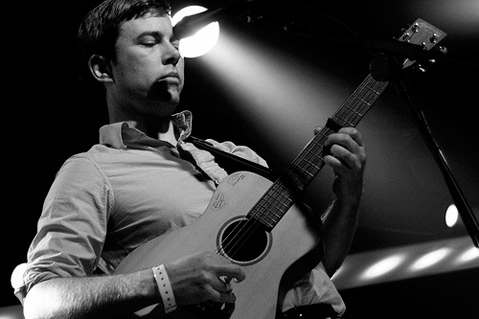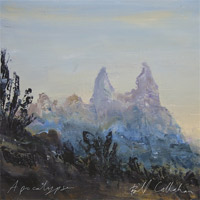Bill Callahan Takes Us to the End of the World
Lo-Fi Pioneer Brings New Album to SOhO Friday, June 17

As Smog, Bill Callahan was an enigma awash in bare-bones recording processes and noisy experimentalism. Since shedding the moniker for 2007’s Woke on a Whaleheart, though, Callahan has truly come into his own. Forever a wordsmith and a thinking man’s songwriter, Callahan’s lyrics are as thoughtful as they are transformative, and are rendered that way by their maker’s unflappable deadpan baritone and measured delivery.
For Apocalypse, Callahan’s latest for Drag City, the songwriter finds himself shedding a layer or two. In place of the string flourishes and lush beauty of 2009’s Sometimes I Wish We Were an Eagle, we get quiet guitars and rickety drum tracks. Themes of traveling, country, and isolation are the driving forces. Cattle and fields pop up along the way, and the whole thing seems to end right back where it began. Below, Callahan responds to our email interview in anticipation of his Friday, June 17 show at SOhO.

There is a dusty feeling to parts of Apocalypse. How, if at all, do you feel like your time in Texas has influenced the sound on this record? I would say it hasn’t. But who knows how the unconscious mind works? I’m trying to figure it out. I do think we see far more than our brains feed us, or it gets filtered out. I think I can see within maybe a 30-mile radius, a bird’s-eye view. So, I think I am more rooted or aware of place than I think I am. But also I spend a lot of time lapping up other parts of the country and world. So, who knows how that seeps in too?
Can you tell me a bit about your time in Austin? What you like about it, why you moved there, why you’ve stayed, etc. I liked the weather here. After five or however many winters in Chicago—it was like nature was trying to show you it could kill you if it wanted. I think that’s why people are pretty humble in Chicago. They know that if the heating goes out one week or if they get stuck somewhere in the snow, they could die easy. Me, I saw a way out so I took it.
At what point in the writing and recording process did you decide to call the album Apocalypse? How and why did you settle on it? I don’t actually remember. I think it was later. Much towards the end. Or maybe even the final act.
Would you say these songs are united by a common theme or perspective? If so, what would that be? What it means to be human and to have a self and to be a citizen. Human, self, citizen, partner. The things you can be.
Some have called Apocalypse a tribute to America, while I read the album’s closing lines to be far more self-referential than that. Why the decision to close the record with the catalogue number? It was kind of to drive the point home of the album being referred to in the lyrics. My record is my apocalypse, and Apocalypse is my record.
Coming off of Sometimes I Wish We Were an Eagle, this record sounds almost gritty. In terms of the writing and arranging, how did the process for Apocalypse differ from Eagle? [Apocalypse] was written in my shed in a two-and-a-half-month period of steady work, seven days per week, 16-hour days. Eagle was more spread out. With Eagle, we recorded basic tracks. and then I gave them to Brian Beattie to write some string/horn parts. Apocalypse just skipped that step. I brought the flute and fiddle player in after the band went home and did the parts by “feel” rather than scripted. It just fit the record better. … Eagle was like a library of sound. Organized and glued together. Apocalypse is a pinball-machine approach.
What is it about these seven songs that necessitated that kind of treatment, rather than, say, backup vocalists and string parts, etc.? I wanted something mobile. And an actual document of the time of recording. I wanted a feeling that this actually happened. These people played together and the singer sang while they played, so what I am listening to now is really music being played, not doctored up for your ear to trick our brains. I like those kinds of records, too. They have their place.
Can you talk a little bit about the story behind “Riding for the Feeling” and, specifically, what that line means to you? I think it’s maybe like what Werner Herzog talks about, “ecstatic truth.”
What about “America?” Where does that song fit into your political ideology and sentiments about the country’s history and present? Wail … I just kind of lay it out there. The pieces. To be assembled.
In terms of process, how does lyrical delivery fit into the program? Are you thinking about the tone and style you’re going to sing in when you’re writing, or is that something that gets addressed in the studio, or…? Oh, I’m on top of it from the get go. It’s part of the writing for me. I think that’s the way songs go — you hear the lines sung as you’re writing them.
Can you talk a little bit about your book, Letters to Emma Bowlcut? When and how did the concept come to you? Is fiction writing something you see yourself coming back to in the future? It’s a novelette I wrote over a five year period, roughly. Just this month I found out it’s being translated into German and Spanish for publication over there. I will definitely come back to the fiction. I think I can knock the next one out faster.
4•1•1
Bill Callahan plays SOhO (1221 State St.) on Friday, June 17 at 8 p.m. For tickets and info, call 962-7776 or visit clubmercy.com.



